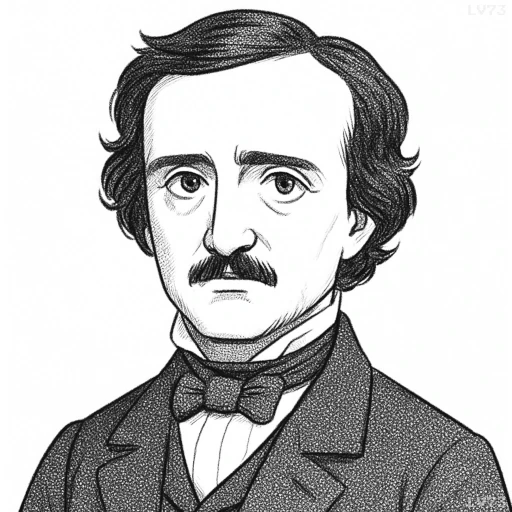“Once upon a midnight dreary, while I pondered weak and weary.”

- January 19, 1809 – October 7, 1849
- American
- Novelist, poet, critic
table of contents
Quote
“Once upon a midnight dreary, while I pondered weak and weary.”
Explanation
This opening line from Edgar Allan Poe’s famous poem “The Raven” sets the tone for the entire work, immediately drawing the reader into a dark, melancholic atmosphere. The phrase “midnight dreary” conveys a sense of gloom, isolation, and perhaps the mystery of the night, suggesting that something unsettling or profound is about to unfold. The speaker’s weariness, both physical and emotional, reflects a sense of exhaustion—not just from fatigue, but from the weight of grief and loss. Poe’s use of the words “weak and weary” hints at a mind and soul burdened by a deep, unresolved sorrow.
Poe’s writing often explores the inner workings of the human psyche, especially the darker aspects like grief, obsession, and despair. In “The Raven,” this opening sets the stage for the speaker’s emotional unraveling, which is influenced by the loss of his beloved Lenore. The nighttime setting enhances the feeling of loneliness and solitude, reinforcing the themes of psychological distress that are central to much of Poe’s work. This line exemplifies Poe’s ability to create a mood and establish a sense of emotional tension that draws readers into the internal struggles of the narrator.
In modern contexts, this line continues to resonate as a representation of existential reflection and emotional weariness. Many people experience moments where loneliness and grief seem to overpower them, leaving them “weak and weary” in their thoughts. Whether in personal loss, anxiety, or deep contemplation, Poe’s words remind us of the human experience of confronting the darkness within and around us. The melancholy that he so vividly describes still speaks to anyone who has felt overcome by sorrow or the weight of life’s unanswered questions, especially in moments of isolation or reflection.
Would you like to share your impressions or related stories about this quote in the comments section?



